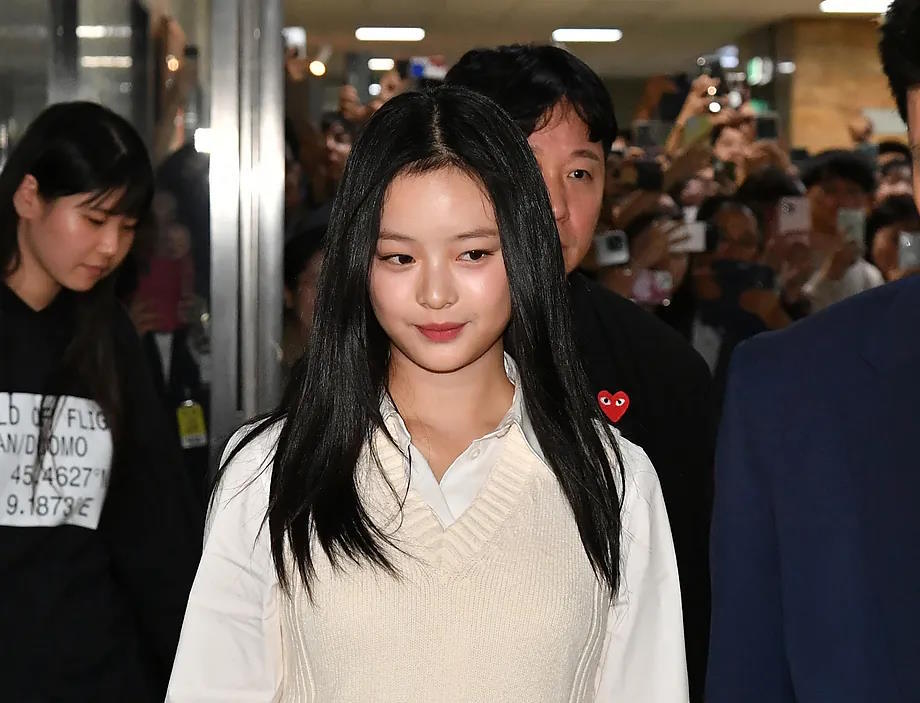Hanni broke down in front of South Korean politicians. She couldn't hold back the tears. This 20-year-old had been under a lot of pressure and noise since she announced that she would testify in the National Assembly, the Parliament of South Korea, for a month. There was much anticipation to hear her testimony. It was the first time that a hearing with a music star as the protagonist denouncing workplace harassment within the K-pop world, pointing mainly at the powerful conglomerate that controls the industry from Seoul, was being held.
Hanni, a singer from the group NewJeans, which frequently tops the charts in the Asian country, sat in front of the committee of lawmakers investigating the labor safety conditions surrounding K-pop on Tuesday. The Korean pop industry has been under close scrutiny in recent years after several suicide cases revealed the darkness surrounding its success.
Hanni, of Vietnamese descent and raised in Melbourne (Australia), was recruited in 2022 by Ador, one of the record labels of the K-pop giant Hybe, the largest K-pop company, the same label behind BTS, the most famous group in the genre. The singer denounced that both she and the other four members of NewJeans had been victims of workplace harassment and ongoing discrimination by their agency.
Specifically, Hanni referred to an episode in which a company manager overseeing a music event instructed other artists to "ignore" the singer from NewJeans. "We have a floor in our building where makeup and hair sessions are held. There were several groups, and I greeted them all. There was a moment when the manager looked me in the eyes, turned to the other artists present, and said, 'Ignore her as if you hadn't seen her.' I couldn't understand why he was acting like that," Hanni recounted to South Korean lawmakers.
The artist, who reiterated that she was testifying voluntarily, stated that these slights in the workplace had been repeated on several occasions by top Hybe executives. According to the young woman's account, at the root of all this would be a dispute between Ador and the parent company.
Min Hee-Jin, the artistic godmother of NewJeans and CEO of the record label, was dismissed earlier this year after being accused by Hybe executives of wanting to break away from the company and create an independent company comprising Ador and Hanni's group.
In a YouTube video posted in September, the band, one of the most lucrative in the national scene (generated 100 billion won in revenue last year, around 67 million euros), demanded Hybe to reinstate Min and began pointing out several episodes of alleged workplace harassment.
"I explained what was happening to the new CEO of Ador, Kim Joo-Young, but she told me it was too late to report it and that I had no evidence," Hanni stated in the video.
"I felt I couldn't stand idly by while that behavior continued," emphasized the singer in her Tuesday testimony, reiterating that all the NewJeans girls had been subjected to "other unfair treatments" by Hybe.
"There was a certain disrespectful atmosphere that we all felt within the company," she continued. Hanni stated that Hybe's public relations department contacted several media outlets and asked them to stop highlighting NewJeans' success and told them to downplay the band's sales increase. "I realized that it wasn't just my perception. I was truly convinced that the company hated us," she concluded.
Following the singer's statements, Kim, the new head of the record label, who initially denied the accusations, also spoke at the hearing held in Parliament, promising that in the future she will "listen carefully" to all artists so that the reported situation does not recur.
Hanni's testimony in front of lawmakers has had a significant media impact in South Korea because it is the first time that a parliamentary committee is investigating labor conditions in the hermetic industry of K-pop, accustomed to controlling every public manifestation of groups, always under extreme pressure from a society that continues to idealize artists who must present themselves as what academic Yoon Kim Ji Young, one of the voices of the MeToo movement in Korea, called the "stereotype of the young single, sexually desirable woman with a perfect public image".
